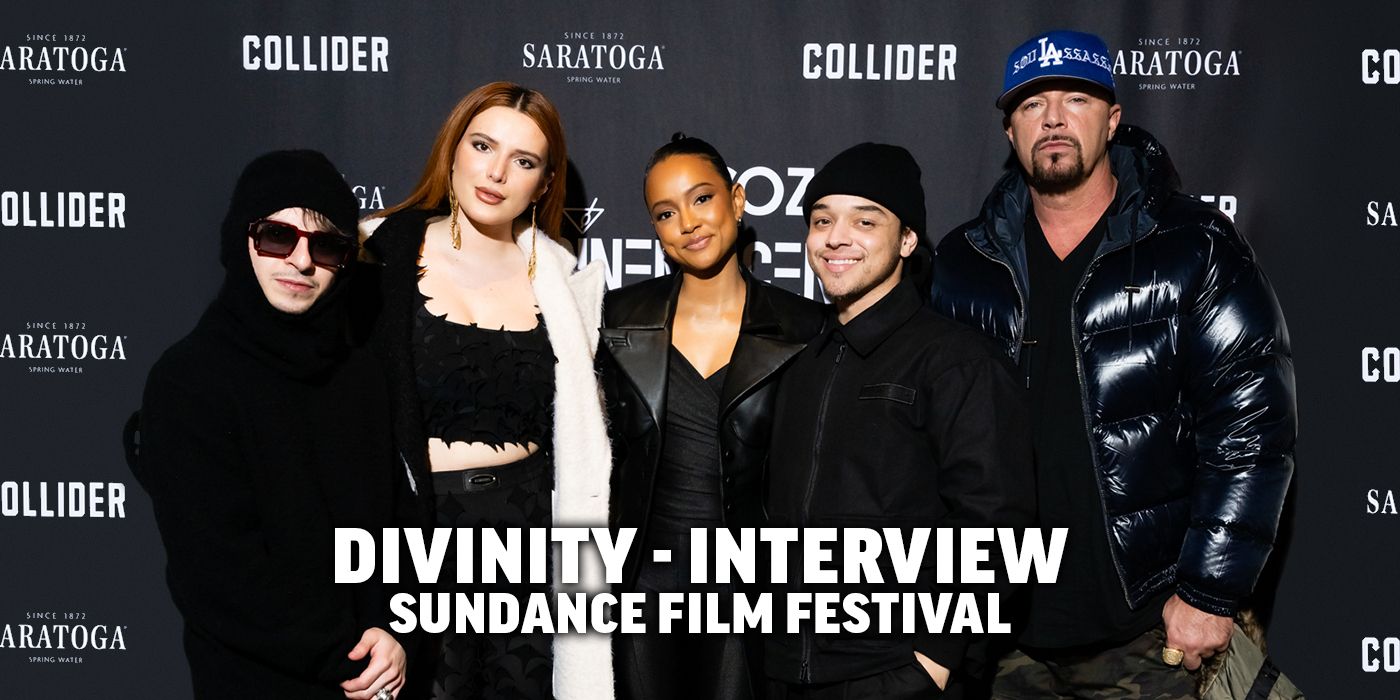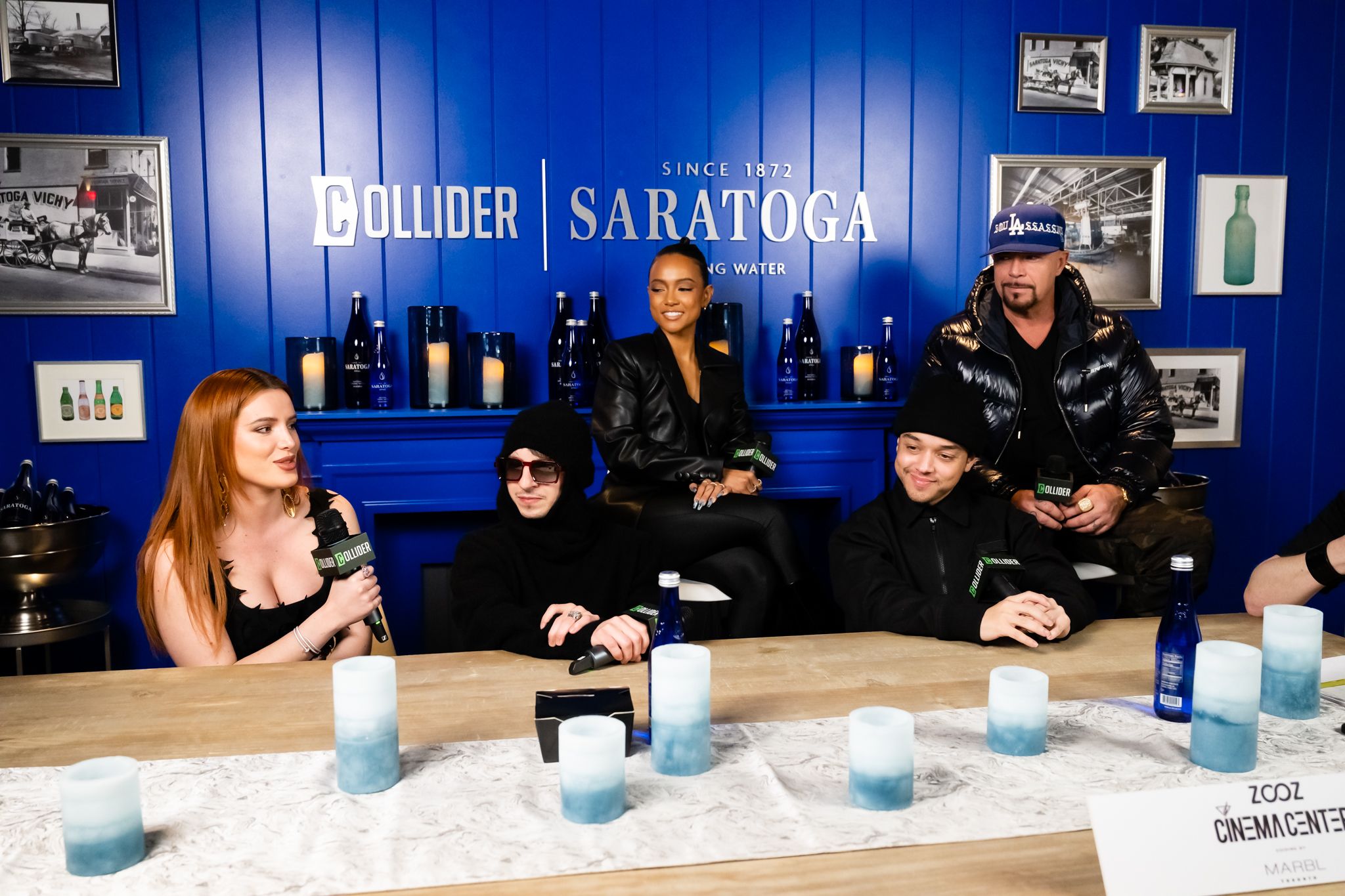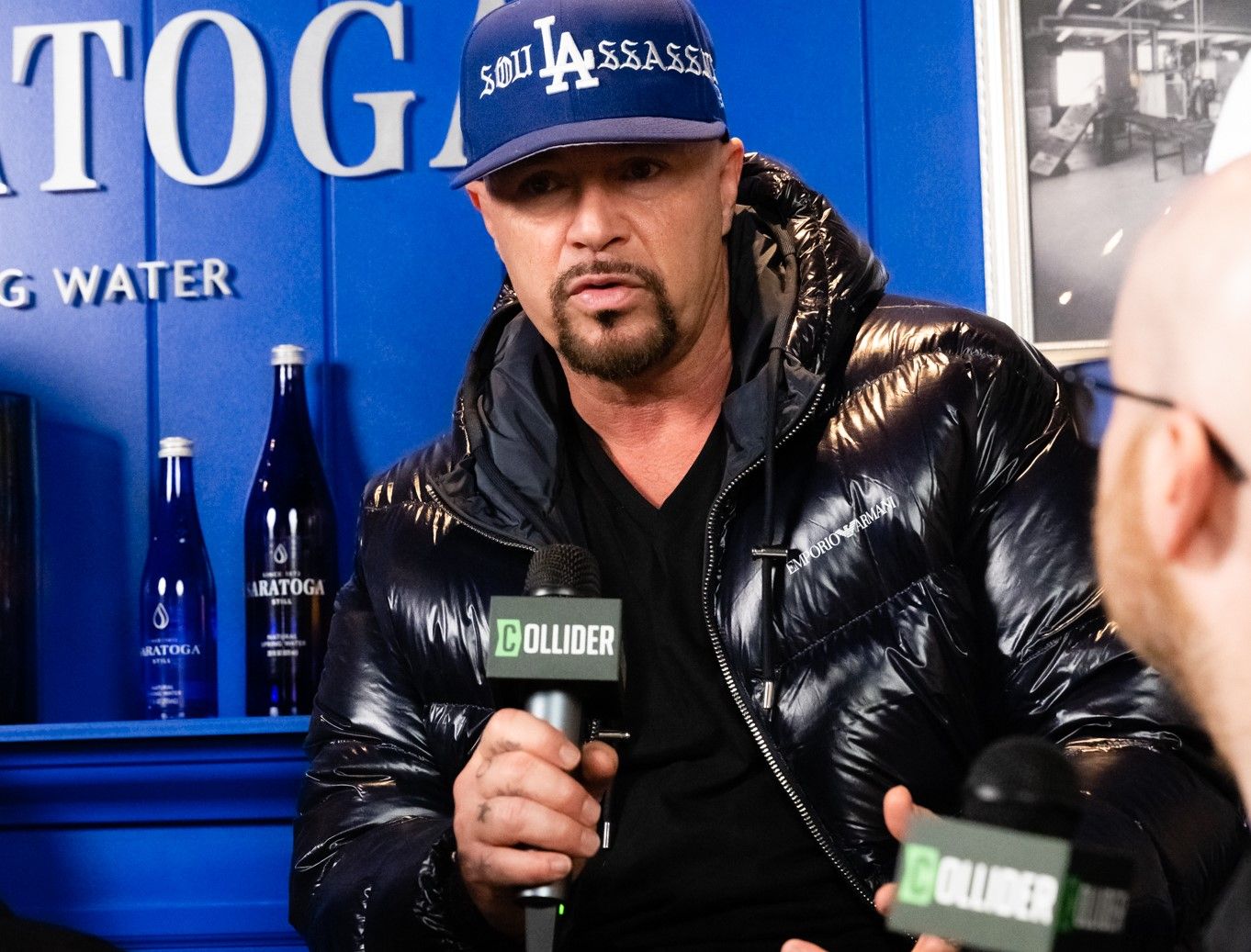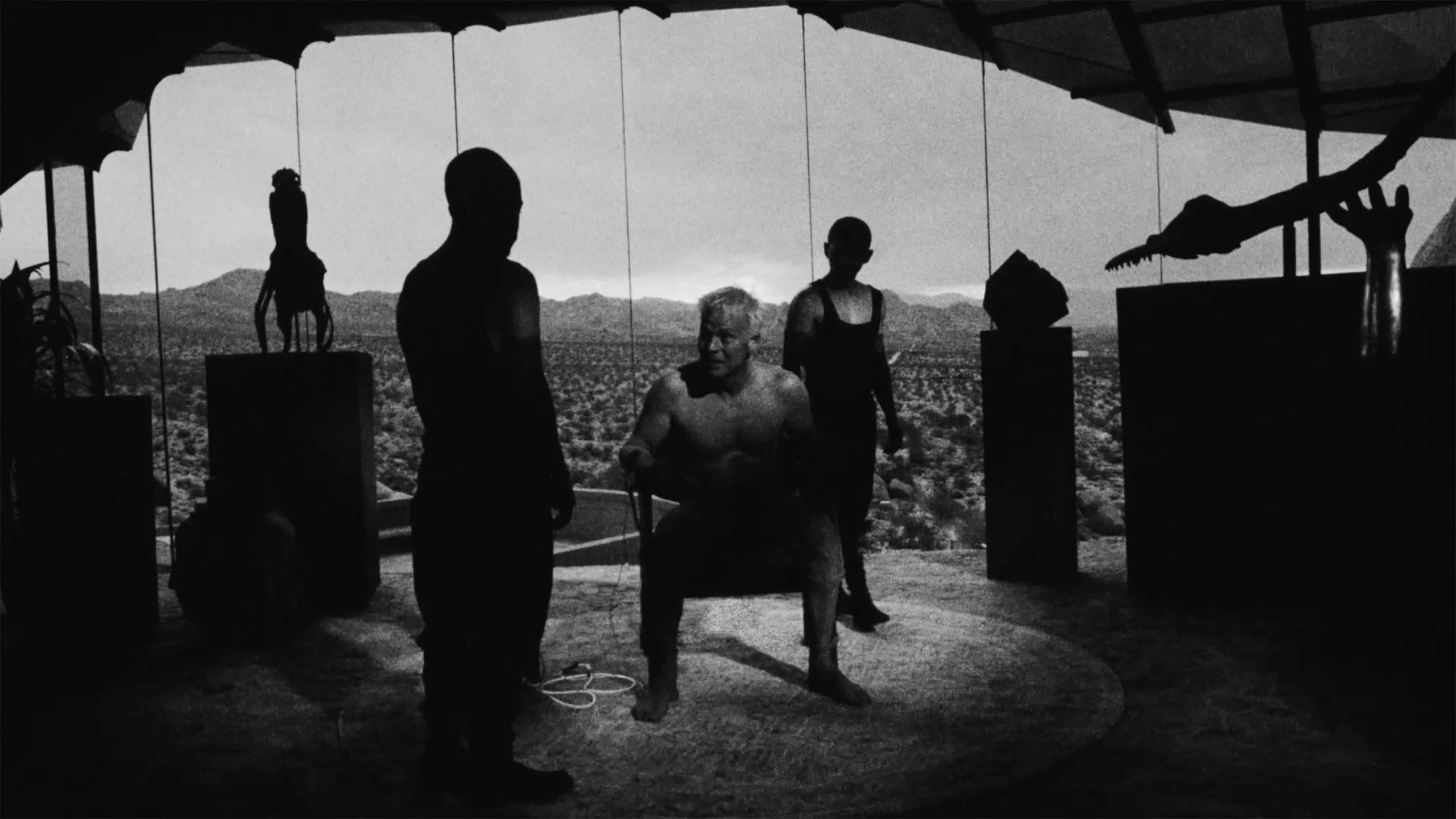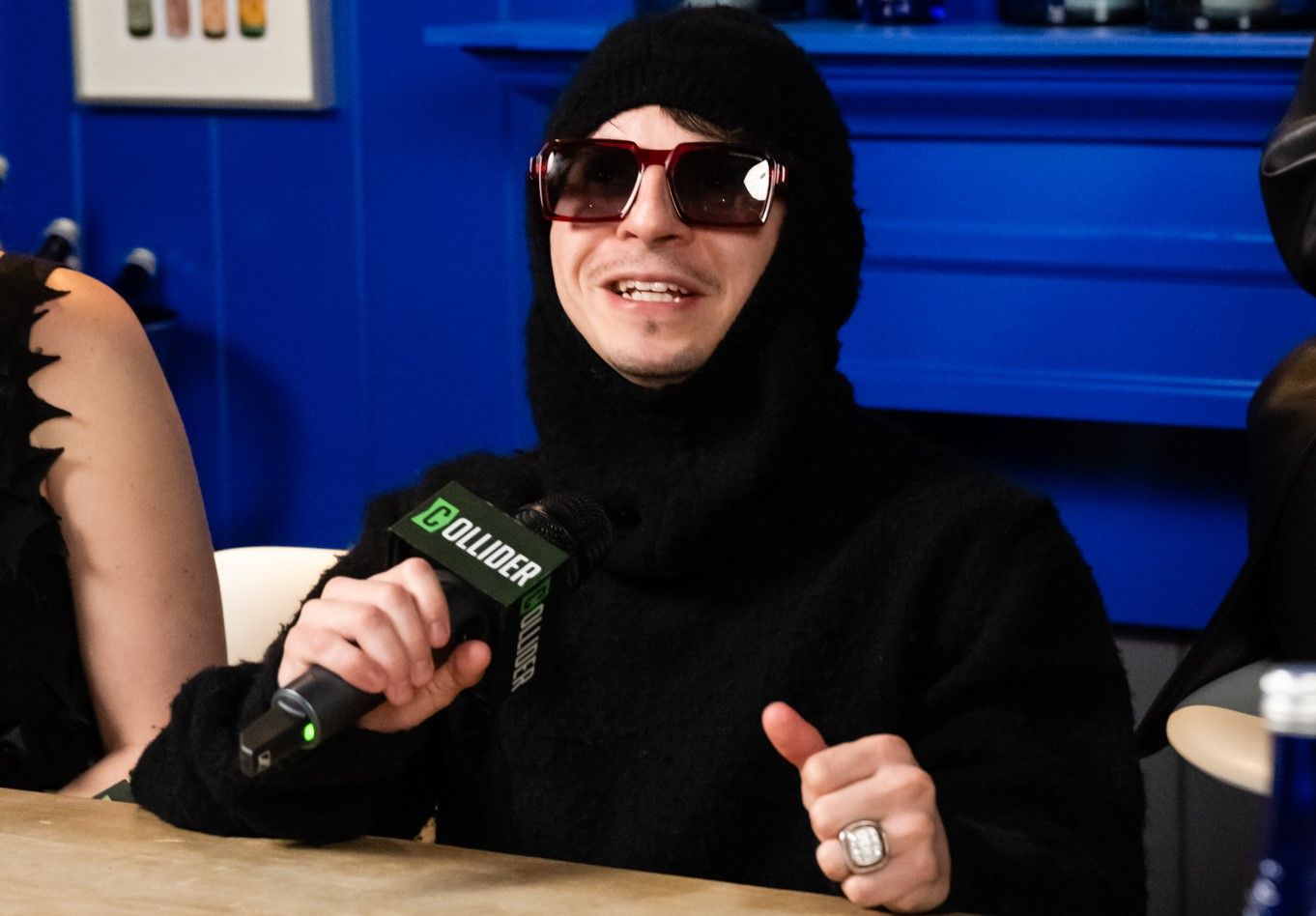Writer-director Eddie Alcazar returned to Sundance Film Festival this year with the premiere of his sci-fi thriller, Divinity. The black and white film is in what the director calls his “meta-scope” style, blending live-action with stop-motion segments, and filmed on 16-millimeter. Set in an uncanny world where humans are now hooked on a serum called Divinity, the film features an ensemble cast of young up-and-coming actors in a bizarre, dueling narrative.
On the one hand, Divinity, a creation set in motion by the ambitious scientist, Sterling Pierce (Scott Bakula), who devoted his life to unlocking the secrets of immortality, is now being manufactured by his son, Jaxxon Pierce (Stephen Dorff). Though it does keep humans physically young, the drug does nothing to stop the mind from aging. On the other, the serum is in high demand on this planet, and comes with other alarming side effects. Because of these, and the effect on society, there are some who would like to see the unbelievable serum done away with, no matter the lengths they must go. In addition to Dorff and Bakula, Divinity’s cast includes Bella Thorne, Moises Arias, Karrueche Tran, and Jason Genao.
Ahead of Divinity’s premiere, Thorne, Tran, Arias, Genao, and the film’s composer, DJ Muggs, stopped by the Collider Studio in Park City to discuss the movie with Collider’s Steve Weintraub. During their interview, they share each of their experiences joining Alcazar’s project, the ways it changed before filming began, and how, ultimately, it was the writer and director’s vision that hooked them. They discuss how working on Divinity was unlike previous projects they’ve done, shooting on film versus digital, and reveal which scenes were the most chaotic, from 120-degree heat and palm tattoos to jiu-jitsu. DJ Muggs tells us how he got involved with Divinity and talks about how this score was outside his comfort zone, and says the sound is “unique” and unlike any work he’s done before. For all of this and more, check out the interview in the player above, or you can read the full transcript below.
COLLIDER: The film has not premiered yet. I have not seen it yet, but I saw the teaser trailer. It looked really cool and different, and not what I was expecting. And I would imagine for all of you guys, this had to have been a unique process working on the film. For all four of you, can you talk about what drew you to the script? What drew you to the project?
KARRUECHE TRAN: For me, I think it was really just the opportunity to work with Eddie. He is such a mastermind in what he does, and we all saw one of my [The Vandal]. That was amazing as well. So I just wanted to be a part of his art and his work. And so when he asked me, I was like, "Oh dude. Yeah, absolutely."
JASON GENAO: Well, I had auditioned for a whole different movie, and then Eddie called me and he was like, "Yeah, let's do it. I want you to be part of this movie." And we were at his house trying to ride a bike… Yeah, no, all this crazy stuff. And then one day he just comes and he's like, "I have another idea, actually."
So I was completely in the mindset that I was going to do a different movie. And then one day Eddie just comes with a whole different script, a whole different mood board. He's like, "Let's just do something else." I was like, "Okay. I mean, I'm down." I was totally prepared to do something else, but because of Eddie and his vision, I was like, “Listen, wherever you trying to go, I'm going to just follow you.”
MOISES ARIAS: Yeah, absolutely. I mean, I think all of us were a fan of Eddie's work, and, initially, I received the same script. I think Eddie wanted us two together. I don't know if people have noticed, but we're pretty similar in many ways. And I think that hopefully, that translates to the image. I think it's these two brothers, mysterious brothers, and I think that in the black and white world, and in the tone of the story, I think what we were able to put together, hopefully, comes together.
BELLA THORNE: Yes, I’m a fan of Eddie's work, I met him at Cannes, and he was just really sweet. We talked about a few projects, and then he talked about this one, and he was like, "Hey, do you have some time to come in and shoot some shit for us?" I was like, "Fuck yeah."
And yeah, I didn't get a script – was not aware that there ever was a script – but then at some point, I was like, "Okay, but, Eddie, I'm going to need you to write me just a little something to work with so that we can..." You know? Because, I think sometimes as actors, you feel a little trained in that way of, “Do this, do that, know your lines, know this world.” And then this was exactly the opposite of that. And that was really fun. It was a really interesting experience. I've never done that before.
Yeah, I can't imagine what that's like. I would imagine when you finally see the finished film, it's going to be an experience.
THORNE: Oh yeah.
TRAN: I cannot wait.
ARIAS: It'll be very interesting.
You have a pretty good resume when it comes to music. If someone has never heard anything you've done before, what is the first thing you want them listening to, and why?
DJ MUGGS: Probably, man, my first album I put out was Cypress Hill in ‘91. That was our whole lives, you know what I mean? Our whole lives was that first album. Everything we was doing, everything we was going through, how we was acting, what was happening. So that would probably be it right there.
I want to do a follow-up. How did you get involved in doing this film?
MUGGS: Well, Eddie reached out for me, and we was talking back and forth for a minute. This is something outside of my comfort zone, so it was a challenge. You know, how to bring the sound and this pulse to this different world. So I was like, "Yeah, I'm up for this. Let's do it."
If you don't mind me asking, where did you start in terms of, did he give you some parameters of what he was looking for? Did he say, "You do this and I'll give you feedback?"
MUGGS: No, we talked, we watched the film a few times. We talked, and then he just let me have at it.
So what can you tease people about the sound?
MUGGS: It's unique. It was unique, and it was a challenge, and it was fun. I don't want to keep rehashing anything that I've done in the past. So for me to have the pleasure to be able to do this was definitely a challenge. And I had a good time making it, man.
I'm going to go back to you guys. A follow-up question, similar to what I just said. For all of you guys, if someone has never seen anything you've done before, what is the first thing you want them watching, and why?
ARIAS: My first Sundance experience was The Kings of Summer. That'll always be very memorable. I was 18 years old, it was the first, obviously, festival I went to with a film. That, because it was sort of my graduation from my childhood to, I wouldn't say a grown man, but a growner man.
THORNE: I did this movie that I liked a lot called Girl. It was very fun. The director was great to work with and he wrote it as well. I love a script that is also written by the director. I always like that.
TRAN: I would probably say a show that I was on called Claws. That was a huge moment and experience for me. And I think it was the final moment where people took me [seriously], and I was able to really show myself as an actor and my art, and be creative. So yeah.
GENAO: I would say On My Block because I think that the writing is so impeccable. Beyond the acting, I think the writing of that is just timeless. So to get to be part of something that I think is almost like this cult phenomenon is a blessing.
I don't know how long you guys actually shot the movie. I don't know the specifics, but for the four of you, what was one day on set that you circled in terms of a challenging day, or something you were excited to film? Or if you could talk a little bit about the making of the film. Because I see your smiles and I know there are stories here.
THORNE: [To Tran] You and I were thinking the same thing.
TRAN: We've all had our own moments. I think we spent maybe a total of a month and a half filming. Part of that was in Joshua Tree, which we did a lot of our work [there]. We had some interesting scenes. I don't know if we want to give away what we did. We had a very intimate scene between all of us.
THORNE: Oh.
TRAN: Yeah, you’ll see it tonight, girl.
THORNE: That'll be fun at the premiere.
TRAN: Yeah, [to Thorne] even we had an interesting, crazy scene…
THORNE: We had a crazy scene in a different way.
TRAN: Where we're yelling at each other and things are happening. I don't want to give the movie away.
THORNE: It's intense.
TRAN: Honestly, everything was.
ARIAS: I was excited it was one location, even though throughout the blocks of shooting, it ended up not being that. But I thought it was going to be nice because of that, and then 120-degree weather is a factor, and our tattoos, which cover our palms, and sweat, and jiu-jitsu fighting. You can imagine how chaotic that can ultimately be.
Did you know that when you first signed on that you'd be doing some of those things?
ARIAS: Yeah, definitely. But I think that we didn't consider the actual temperatures. It was too much.
THORNE: He's basically saying it's a shit show because makeup's going everywhere, and it's falling apart, and it's all hot and sweaty. Everybody feels like they're going to pass out.
Are you trying to say that making movies is not as glamorous as people think?
GENAO: Yeah, I had to adult real quick. I went from playing 14 to – you'll see – not 14. Maybe some crazy 14-year-olds.
But there was also this one day that we had to do a scene where we eat. And usually, you do scenes with foods in movies, and you have a spit bucket. But Eddie just wants to keep going, and you're also shooting on film, so it's not as easy to manipulate. So we had to actually eat this food. And I'm just so sensitive that between every cut I was ready to throw up, and ready to die on this set. It was a lot of fun, but it was the most intense…
ARIAS: Turkey, papaya…
GENAO: But he wanted us to eat like animals, like monsters, with our hands, and it was just like, yo. Little traumatizing.
I've spoken to a lot of actors about eating scenes, and someone told me they ate seven platefuls of pasta. Oh, Joel Kinnaman, when he was filming. He will eat whatever's in front of him, and then other people try to minimize because it's challenging.
GENAO: Or they always have a little fruit bowl, or a salad because they're like, "I can do this seven times." But no, we had a whole Thanksgiving feast.
One of the things that I think is cool is, you shot in black and white, Stephen [Dorff] was just saying to me the same way that Darren Aronofsky shot Pi with the black and white 16-millimeter reversal footage. I don't know how often you guys work with film, but it's not often for a lot of people. So what was that like?
ARIAS: 15 years ago it was film, and it switched to digital. And now I feel like I've been doing a lot of stuff on film.
Oh, for real?
GENAO: Wait, back then you were doing a lot of film?
ARIAS: Yeah, yeah. In 2005?
GENAO: Interesting. I haven't been working that long.
What was it like for you guys?
TRAN: Like Jason was saying, [there are] certain things you can't manipulate. There's a longer process. What was that tent where the dude had his hands in there? He was processing the film, I think, as we were shooting. So it's more than just hitting record and go. But it looks stunning, so it's all worth it.
ARIAS: And 16-mil, you need a lot of light. A lot of light, a lot of hot light.
It's great when you're filming outside in 120 degrees.
GENAO: No, they would bring lights inside that were hotter than 120 degrees. Yeah, it was intense.
MUGGS: 120 degrees-plus lights.
Like I said, filmmaking, it's very glamorous. When you were making this, did you have any idea that you were going to be part of Sundance? Because it's very cool to be here with the film.
TRAN: No, I don't think we knew. I think we kept our fingers crossed in hopes that we would be here, and we're here, and it's my first experience. And it's just amazing, and awesome to be here. Yeah.
GENAO: I've been here, but it was not a movie I had. It was like an award thing.
When you're composing and you're working on the music, are you using a similar software to what you've been doing? Or how has it advanced as technology has advanced?
MUGGS: The symphonies are sick. They sound like real symphonies, orchestras, and all those sounds. Otherwise, I'm using the same stuff. On the beat side, when I'm doing the beats, that's traditionally what I do. But when it comes to the sounds and the orchestral sounds, that sounds like a real orchestra now. It doesn't sound like keyboard shit at all.
How much back and forth went on with the music on this?
MUGGS: I pretty much nailed it, like 80% the first time. Then there [were] some details we had to dial in. But we got it, yeah.
I am curious if you guys are going to see any other movies while you're here, or are you in and out of the festival?
ARIAS: Yeah, sadly I'm in and out.
GENAO: Pretty in and out, but I definitely want to see everything that I'm hearing about. So I'm going to just go to the theaters.
Special thanks to our 2023 partners at Sundance including presenting partner Saratoga Spring Water and supporting partners Marbl Toronto, EMFACE, Sommsation, Hendrick’s Gin, Stella Artois, mou, and the all-electric vehicle, Fisker Ocean.

